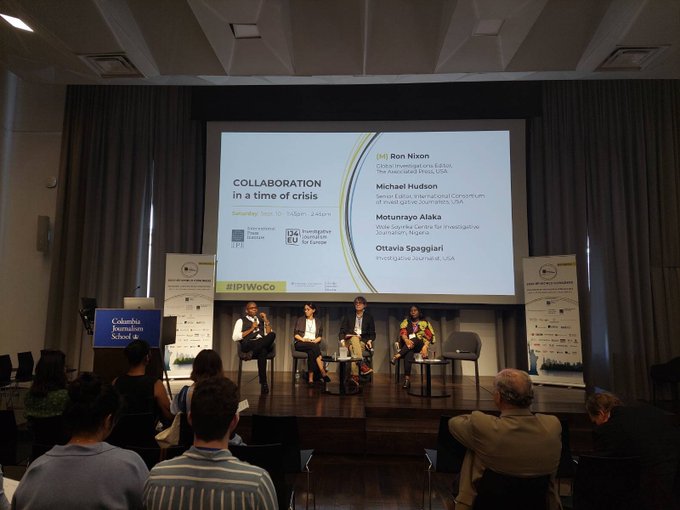The value of trust in a collaboration project can’t be overstated, top experts in investigative journalism said at an IPI World Congress 2022 panel on working together in times of crisis. The conversation was moderated by Ron Nixon, global investigations editor at the Associated Press and was produced in association with IPI’s Investigative Journalism for Europe (IJ4EU) Fund.
Gaining fresh points of view, knowledge exchange, sharing the financial burden. There are many good reasons to collaborate on journalistic projects but also a few rules that go with it, the expert panelists agreed. “Collaboration kills competition we don’t need”, summarized Motunrayo Alaka from Nigeria’s Wole Soyinka Center for Investigative Journalism.
“The thing about collaboration is that it stops the competition I think is unnecessary anyway, the competition of who gets the story first. With collaboration, you have to step back and get a bigger picture”, said Michael Hudson, a senior editor with the International Consortium of Investigative Journalists (ICIJ). By way of example, Hudson highlighted one of ICIJ’s latest projects, the Pandora papers investigation, which saw over 600 journalists and different media organizations work together to expose a shadowy financial system benefiting the world’s rich and powerful, eventually triggering multiple government investigations.
⚡ War, the pandemic, climate change — desperate times call for new forms of cooperation. But what are the challenges that come w/ journalistic collaboration?
Day 3 of the #IPIWoCo continues with a panel on collaboration w/ @nixonron @MichaelWHudson4 @D_Encourager & @OttaviaS pic.twitter.com/nrW1fhGCBB
— IPI – The Global Network for Independent Media (@globalfreemedia) September 10, 2022
Investigative journalist Ottavia Spaggiari brought a freelancer perspective to the discussion, emphasizing the peer support that comes with collaboration. “When you get stuck, you need people, you need peers”, said Spaggiari.
This makes it important to work with people who are willing to share and cooperate, the panelists agreed. “When you’re working in a team, it’s not your information, it’s the team’s information”, said Spaggiari.
Key rules for collaboration
So how do you manage massive amounts of information and the many journalists working on the story? Hudson from ICIJ highlighted some key ground rules for successful collaboration. “For example, we all agree to publish at the same time, which takes the pressure off of being out-scooped”, he said. “Secondly, it’s important to be open about your findings. However, often the spirit of collaboration sort of takes over: someone will post about their findings and it snowballs from there with journalists comparing their findings and getting new ideas.”
Alaka from Nigeria’s Wole Soyinka Center for Investigative Journalism added that it’s important to have a strategy from the beginning. “We can’t collaborate anytime on anything”, she said.
For Spaggiari, being organized is also essential. “Even in a small team, you need a project manager. Someone who sends out an agenda for meetings, keeps track of the minutes of the meetings and afterwards sends an email on who does what”, she said.
Ultimately, successful collaboration comes down to trust. Hudson said that ICIJ has had cases before where someone publishes the story too early, unfairly out-scooping everyone else. In these cases, the solution was not to work with that person anymore for a set time period, which could be a few years.
Indeed, trust is currency in collaborative projects, the panelists agreed.
